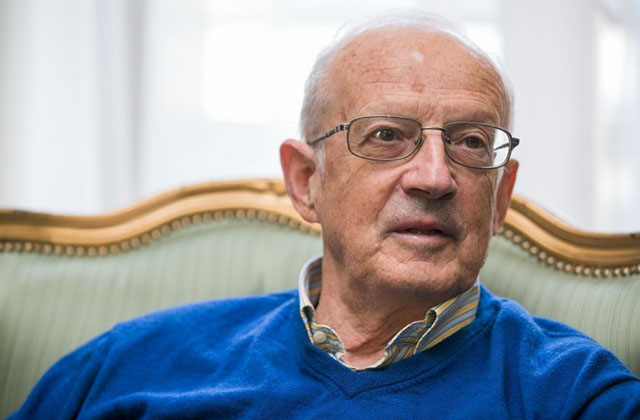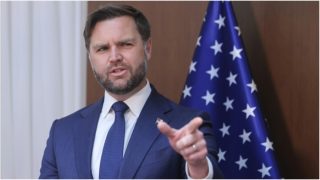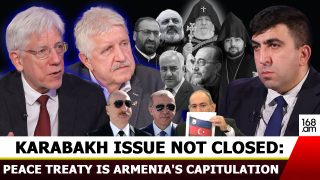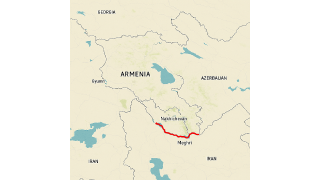
Armenia’s Authorities are at a Deadlock, They Need to Be Independent from Moscow in some Issues: Andrey Piontkovsky

Interview with Andrey Piontkovsky, Russian, oppositional politician, publicist, on two-week dramatic developments in Yerevan, activities of “Sasna Tsrer” armed group, claims and lessons learned from the situation.
Mr. Piontkovsky Armenian “Sasna Tsrer” armed group kept the police precinct seized for two weeks, claiming resignation of RA president Serzh Sargsyan. All these were accompanied with mass gatherings, marches and clashes between the Police and the demonstrators. Claims were heard around the process directed to RA president to clarify whether he was going to concede the districts around Karabakh, in accordance with Russian exerted plans. Yesterday the armed group put down the arms, however, the situation will be much touched upon. In your opinion, what has led to radicalization of such protest against the authorities?
Of course, the Armenian society follows and understands what’s going on in the whole post-Soviet space, i.e. this was Yerevan’s manifestation of a general regress, protest against the existent issues in the post-Soviet space. However, motor of Yerevan developments, in my opinion were internal issues, like in the whole post-Soviet space. After the collapse of Communism in almost all the countries and Baltic countries, bandit-states, copies of Putin’s regime were being restored, which led to wide-range claims of the society, degradation, thus, social discontent in this territory is reaching large volumes and obtaining different shapes.
We saw orange revolution in Georgia, Ukraine, mass marches and protests in Moscow, Kazakhstan, i.e. these developments are inevitable under the existent regimes in these countries. Armenia is one of the most prominent post-Soviet countries. It’s authorities are a group of people, who not only led the country, but possess country’s assets, that system can’t be eternal, as it can’t provide economic development and prosperity, only the opposite process may be recorded. Thus, such developments and situations would be established sooner or later and will yet be established.
I’ll reply to the question why this occurred now and not half a year ago. As you said, all these are conditioned by Moscow’s new plans as well. In fact, Moscow intends to convince Armenia’s president to concede those territories and deploy a peacekeeping mission in Karabakh. Thus, Moscow intends to increase military presence in the South Caucasus by all means. Moscow bothers about the settlement of the issue the least, it’s interested to maintain tension to have leverage of influence towards the capital. And by deploying new forces in the South Caucasus, Moscow will be able to prevent the process of developments not so preferable by it, as it’s afraid of the defeat of pro-Russian “Georgian dream” party of Ivanishvili. Moscow’s interest is rather clear to me.
Position and mentality of the Armenian side was acceptable for me, as people in Armenia have thought for years that they live in hard socio-economic conditions, but they reached Karabakh’s independence, won in Karabakh war. However, it turned out that Russian plans put under threat what the Armenian society considers the only acquisition for the last 25 years. The Armenian society understood that tolerance is improper.
I don’t imagine yet what destiny will the group members have. In my conviction, they are heroes, who endangering their lives, took that step to raise discontent, as a result of which it turned out, that greater part of the society supports their claims. Their arrest, their prosecution and such violent actions towards them and their supporters won’t eliminate discrepancies, discontent of the society, which I have touched upon. This discontent will only grow.
External mediation in existent situation is being touched upon, both Russian and Western. There is a hypothesis, pursuant which, through such crisis Moscow tried to urge, threaten RA president to agree on withdrawal of the territories. How justified is seeking for external mediation in these developments?
I don’t observe external mediation. As I already said the situation has internal Armenian reasons, and they’ll even more deepen. These variants don’t seem logical to me. Moscow wants Sargsyan to concede territories, but in his recent speeches group members were expressing against this issue. But these developments showed that not everyone share their methods of struggle, people share the claim regarding the existent situation and withdrawal of territories. Thus, even if this is provocation by Moscow, it was unsuccessful, it didn’t approach Moscow to its purposes. After these developments it’s more difficult for Sargsyan to discuss conceding of territories, rather than prior to these developments.
The day prior to their surrender one of the group leaders stated that they should fight against decolonization, meaning elimination of dependency from Russia. What does this claim speak of? What conclusions should the authorities draw?
I tend to give advice to the authorities the least. Use of the term ‘decolonization’ was interesting to me, and unfortunately, use of this term is proper. Not a single post-Soviet country, even countries regarded as Russia’s vassals, appeared in such dependency from Russia. For instance, Belarus and its position in Russia-Ukraine conflict. Armenia’s authorities have totally failed Armenia’s foreign policy, not speaking of the domestic policy, economic policy dragged to a deadlock, that in half an hour Moscow solved the issue of failure of Armenia’s association with the EU. Armenia’s authorities have no other way out, than showing independence, sovereignty from Moscow, for instance, regarding deploying that very peacekeeping mission. This may really become a fatal decision for Armenia, as already mentioned maintenance of these issues threatens new likewise and deeper crisis to Armenia.
Russian MFA official representative Maria Zakharova didn’t exclude Turkey’s participation, in her words—positive investment in NK conflict peaceful settlement. What does this mean for NK conflict and the South Caucasus against the background of Russia-Turkey rapprochement?
This means nothing good. Generally Zakharova is a tactless woman, her style in foreign policy is just astonishing. For instance, in Europe after each terror act she threatens to Europe, if the latter didn’t cooperate with Russia, more explosions will be heard in Europe. She doesn’t even hide that Moscow has connection with those explosions and certain influence on the activity of Islamists. Her words regarding Turkey is the following, “If you don’t obey Moscow, Turks will organize another Genocide for you.” This should be perceived in the context of NK conflict. I would comment the meaning of that statement this way. This is simply manifestation of absolute unawareness of history and stubbornness towards a country, which is considered a vassal in Moscow’s world.
By Araks Martirosyan























